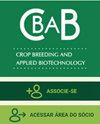Genetic gain in Passiflora seed traits from recurrent selection among full-sib families
IF 1.1
4区 农林科学
Q2 Agricultural and Biological Sciences
引用次数: 0
Abstract
Abstract The germination potential must be considered in the selection of passion fruit genotypes, since vigorous seeds originate seedlings with a higher growth rate, resulting in superior plants with high agronomic performance. This study proposes to estimate genetic parameters and selection gain for seed traits of full-sib families (FSF) of passion fruit under recurrent selection for resistance to the cowpea aphid-borne mosaic virus (CABMV). Physical and physiological seed traits of 86 FSF were evaluated; genetic parameters, genotypic correlations between traits and genetic gains were estimated using four selection indices. There were significant differences and genetic variability between families and positive genetic correlations between variables. The best distribution of genetic gains was obtained by the Mulamba and Mock index, using the heritability coefficient and arbitrary weights. This index selected the best 26 families in terms of seed characteristics to compose the second cycle of recurrent selection for resistance to CABMV.全同胞家族循环选择对西番莲种子性状遗传增益的影响
本文章由计算机程序翻译,如有差异,请以英文原文为准。
求助全文
约1分钟内获得全文
求助全文
来源期刊
CiteScore
2.40
自引率
13.30%
发文量
25
审稿时长
6-12 weeks
期刊介绍:
The CBAB – CROP BREEDING AND APPLIED BIOTECHNOLOGY (ISSN 1984-7033) – is the official quarterly journal of the Brazilian Society of Plant Breeding, abbreviated CROP BREED APPL BIOTECHNOL.
It publishes original scientific articles, which contribute to the scientific and technological development of plant breeding and agriculture. Articles should be to do with basic and applied research on improvement of perennial and annual plants, within the fields of genetics, conservation of germplasm, biotechnology, genomics, cytogenetics, experimental statistics, seeds, food quality, biotic and abiotic stress, and correlated areas. The article must be unpublished. Simultaneous submitting to another periodical is ruled out. Authors are held solely responsible for the opinions and ideas expressed, which do not necessarily reflect the view of the Editorial board. However, the Editorial board reserves the right to suggest or ask for any modifications required. The journal adopts the Ithenticate software for identification of plagiarism. Complete or partial reproduction of articles is permitted, provided the source is cited. All content of the journal, except where identified, is licensed under a Creative Commons attribution-type BY. All articles are published free of charge. This is an open access journal.

 求助内容:
求助内容: 应助结果提醒方式:
应助结果提醒方式:


